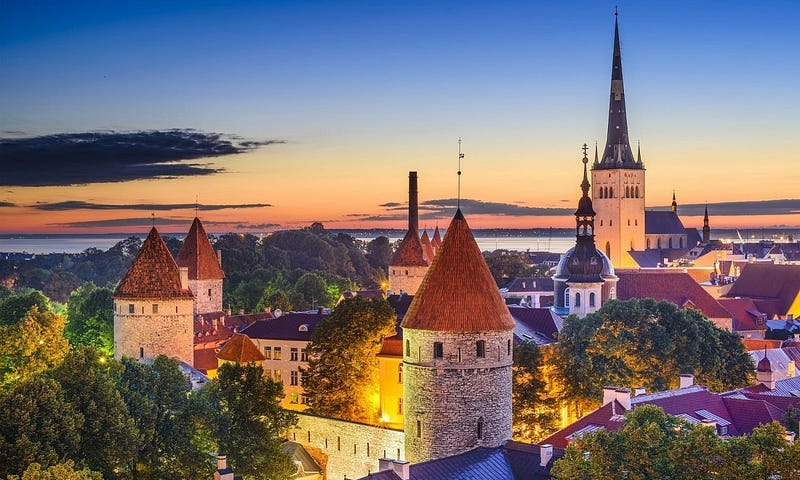Russia Issues Arrest Warrant for Estonian PM
Putin's hatred for Estonia could potentially tilt us into a war with Russia
Vladimir Putin despises Estonia. There is something in their lack of gratitude for “saving” them from the Nazis during World War II that really gets under his waxy skin. The Kremlin has just decided to up the ante by putting Estonia’s prime minister, Kaja Kallas, on an international wanted list.
I want to believe that Ms. Kallas is safe sitting in her official residence in Tallinn, the tiny nation’s charming capital, but given Putin’s historical disgust for Estonians, something inside of me makes me fear that this arrest warrant could be used as both a way for Moscow to increase pressure on the U.S. to stop supporting Ukraine; and, as a way for Moscow to aggressively reassert itself in the Baltic Region, which the Kremlin has always regarded as a “near abroad” a la out own Monroe Doctrine.
The population of Estonia is 1.3 million, of which 24 percent are ethnic Russians. Many of these Russian-speaking people remained in Estonia after the collapse of the Soviet Union in 1991. Others have arrived from Russia, Belarus, and Ukraine over the years. Putin has used Russian propaganda and state-controlled media for nearly two decades to fan nationalistic flames against Tallinn. Right around when Putin was taking power, Tallinn passed a law requiring all residents to speak with a certain degree of fluency to work. Soviet-era Russians found this offensive, and kids coming of age in 2000 regarded Putin as their hero defending their rights.
Putin’s support created a lot of strife in Estonia. Soviet-era war monuments became meeting places for Russian nationalists, and many times, after crowds of young Russians would gather, they roamed around the cities, tearing things up and starting brawls. Moscow was instigating the chaos to plant the seeds for the repression of ethnic Russians. Putin then warned Tallinn that if the “repression” continued, Russia would act in the interests of its citizens living in Estonia.
If any of this sounds familiar, then it should. Putin used the same strategy to justify first the seizure of Crimea and then the invasion that took place in 2022.
Occupiers
From 1919 to 1939, Estonia was an independent nation. Having declared independence when czarist Russia collapsed, the country has a strong cultural identity and is very protective of its right to exist. Linguistically, there is nothing in common between Estonia and Russia. The Estonian language is actually closer to Finnish and Hungarian, so geographical proximity has not created any special bonds.
When the Soviet Union invaded after signing the Molotov-Ribbentrop Pact, the Red Army and NKVD (Soviet secret police) brutalized the men of Estonia. Thousands were executed or shipped off to Siberia labor camps. Like the Latvians and Lithuanians, Estonia formed an effective guerilla force in the country’s vast forests and terrorized the occupiers. When Nazi Germany rolled through during its invasion of the Soviet Union, Estonians greeted them as liberators.
To this day, every Soviet-era war memorial praising the Red Army is regarded as salt in the national wound of Estonia. The monuments are reminders that an unfriendly nation with a penchant for murder and destruction sits just off to the east — a country whose population is 150 times larger than Estonia and, now, a nation that has demonstrated that invading and terrorizing its neighbors is a totally acceptable course of action.
Since the war started, it has been said that Russia’s agents — spies — are everywhere. In Portugal, there are members of the community of Russians that definitely strike me as employees of Russia’s FSB — secret police. Russia spends more time spoiling and gathering information to later punish people for freely expressing themselves because it has nothing good or positive to offer the world. I am more than certain that Estonia is filled with Russian agents, given its shared border with Russia.
Despite Estonia being a member of NATO, I am not sure the world would go to war — Article 5 — if Ms. Kallas suddenly vanished and ended up in a courtroom in Moscow. Russia, being Russia, would make up some lie about how Kallas chose to come to Moscow herself, thus once again muddying the waters of truth and so making a NATO response seem like warmongering and overkill. This is how Russia succeeds at delivering its evil. It functions in the shadows, mastering nuance, thus giving rise to doubt about its guilt.
The Kremlin does not accept Estonia’s independence in the same fascist way that it denies Ukrainians are a separate people. I sadly don’t doubt that Moscow’s efforts, which will be taught in schools and played out 24/7 on the state-controlled media, will turn most of the independent countries that used to be Soviet republics into just wannabe nations inimical to ethnic Russians, thus warranting invasion and cleansing.
Vladimir Putin has uncorked the kind of fascism we thought was behind us, and if, in November, the United States falls to Trump’s fascist revolution, then God help the world and people like Estonians.




Great conclusion !!!